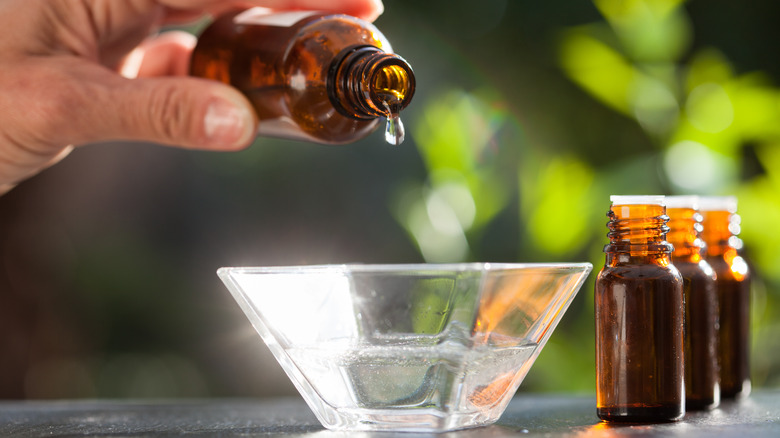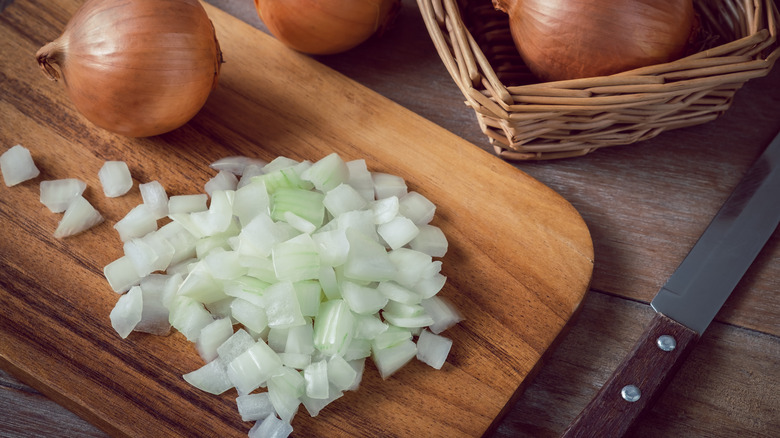Is It A Mistake To Add Essential Oils To Your Paint? A Pro Says There's A Catch
Painting a room or a home yourself is a challenging feat. Before you can even get into the physical labor, there is a lot to learn about how to make the paint go on smoothly and look good for years to come. The internet is full of tips and tricks about how to make this happen. One of the more surprising is the long-standing belief in adding essential oils to your paint. The idea behind mixing additives in with your paint is that, well, frankly, paint stinks. It has a very distinctive smell, and the scent of a fresh coat of paint can linger for days.
While it might seem like the best idea in the world to rid your paint of that icky smell — at least according to social media — experts like Nailed It Contracting's Sam Ross insist that adding essential oils to your DIY projects is anything but simple. There are numerous reasons you never want to add anything to your latex paint — especially a holistic oil — and a lot of them have to do with hidden costs and warranties. OK, you might be saying. I can't add oil to my latex paint, but what should I do about the smell?
Don't worry; we got you. Below, we break down everything you need to know about adding oils to your paints and what you risk doing so. As for ridding yourself of that stinky paint smell, we cover that too.
Essential oil to can end up costing you a lot
As tempting as it might be to add a few drops of peppermint oil to your latex paint tray, experts insist this is just about the last thing you want to do if you're hoping for a seamless DIY project. First and foremost, understand that paints are complex and specially formulated. Adding anything to them, be it water essential oil or even just a drop of olive oil, can mess with the formula and thus void the warranty, painter and contractor Sam Ross assured Apartment Therapy.
A warranty may seem silly. It's just paint, not an expensive home appliance, but the cost of painting a few walls, let alone several rooms, can add up quickly. If your color comes with a warranty, you can reach out to the supplier should anything, such as peeling, occur after the paint has dried. If you've added a few drops of lemongrass oil to the paint and it begins to peel, well, the manufacturer owes you nothing, and you'll be on the hook for the costs of repainting.
If you really can't stand the smell, try adding some oil to your sealant. The sealant goes on in a thin layer as the paint dries. Unlike latex paint, there is no threat of the sealant separating with an additional ingredient like peppermint oil. Just be careful about how much you add, though; a little goes a long way when it comes to essential oil.
Get creative to hide those odors
Painting expert Sam Ross insists that there isn't a need to cover up the smell of drying paint, as manufacturers have made leaps and bounds in making the drying process more tolerable in recent years. However, if you absolutely cannot stand the smell of paint drying, you still have a few options for making the scent more tolerable. The best way to mask one order is with another one. To distract yourself from the scent, try chopping onions and leaving them room as the paint dries. This will overpower the smell of drying paint and inspire everyone in your household to get some much-needed time outside, as neither smell is particularly inviting.
It goes without saying that a house that simultaneously smells of latex and onions is not for everyone, in which case things like bowls of activated charcoal, baking soda, and coffee grounds strategically placed around your home can help absorb the scent while offering minimal odor themselves. Of course, if you still like the idea of essential oils, soak some cotton balls in a scent of your choice and let the odor diffuse through your home.
Ultimately, the best way to absolve yourself of that stinky paint scent is to air out your house. Opening doors and windows and plugging in an air purifier is often the best (and most holistic) approach to ridding your home of heavy fumes.


